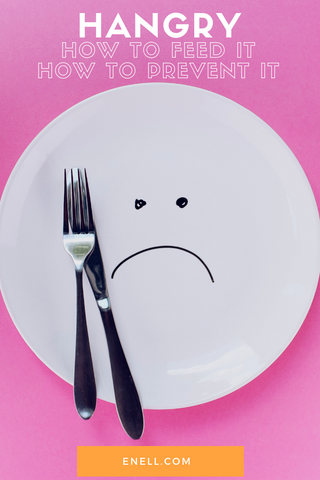How to Feed the Hangry, and Prevent It
If you’ve ever been hangry, every loved one, co-worker, and unfortunate restaurant hostess knows about it. The intense feelings that come with primal hunger are irrational and irritable, and often complemented by lacking concentration, shaking, and racing heart. Getting too hungry may even make you feel anxious, more prone to mistakes, and completely incapable of making a decision.
The intersection of extreme hunger and the anger that comes with it has been colloquially coined as HANGRY, a term common enough that Oxford put it in the dictionary.

When we eat, our blood sugar spikes quickly and then slowly tapers off as the hours between meals pass. That’s when we get hungry again, when the glucose diminishes. Our brain critically depends on glucose to operate, so when it starts to get low we receive signals to address it - like lower energy or stomach growls. The more we ignore it, the more our brain panics as if it’s a life-threatening situation. That’s when the switch gets real, and our worst side shows itself.
Michael Lowe, a psychology professor and eating disorder specialist at Drexel University, told Wall Street Journal that as the body gets hungry it releases the hormones cortisol and epinephrine as a warning that blood sugar levels are diminishing. This was an evolutionary response during our caveman / hunter-gatherer days, so that we could start planning ahead to eat before the situation became dire. Our modern habits - with dieting or overeating - actually interrupt the normal process for eating only when we’re truly hungry. It’s further support for the argument that we should eat for fuel, not pleasure.
WHAT CAUSES HANGRY FEELINGS
The simplest cause for hanger is waiting too long to eat when your body is sending hunger signals. The longer you wait, the lower glucose levels fall, which spawns all of those physiological responses like the shakes, headaches, weakness/low energy, and mood swings.
Nutrition coach Mary Vance also says skipping meals, eating too much sugar (especially at breakfast), starting the day with coffee only, or not filling up with enough protein/fiber/fat can all cause hanger to consume your otherwise pleasant demeanor. Being mindful of when and how you eat can be the simplest and most effective way to prevent a hangry rage episode.
Lowe advises spreading food intake out across the day, eating more often but less quantity each time. This helps to maintain blood sugar levels and avoid the crash.
WHAT TO EAT WHEN YOU’RE HANGRY
When you’re feeling hungry but can’t stop for a full meal, or entering the danger of the hangry zone, focus on snacks that satiate and sustain, include fiber / fat / protein, and can quickly normalize blood sugar. These aren’t unlike the foods you should eat before a workout.
- Avocado toast on whole grain bread
- Cottage cheese and apples
- String cheese and grapes
- Fresh veggies with salsa, guac, hummus, dressing, or nut butter
- Handful of nuts (like almonds) and/or seeds (like chia)
- Plain yogurt with berries
- Edamame
- Plain oatmeal with nut butter
- Popcorn
- Turkey or tuna sandwich with fresh veggies
- Jerky
- Hard boiled egg with whole grain muffin or toast
- Soup
- Protein bars that are “clean” and natural, like Lara or Kind
DO NOT try to feed the hangry with cookies, candy bars, or other low-nutrient, high-sugar treats that only exacerbate the problem.


